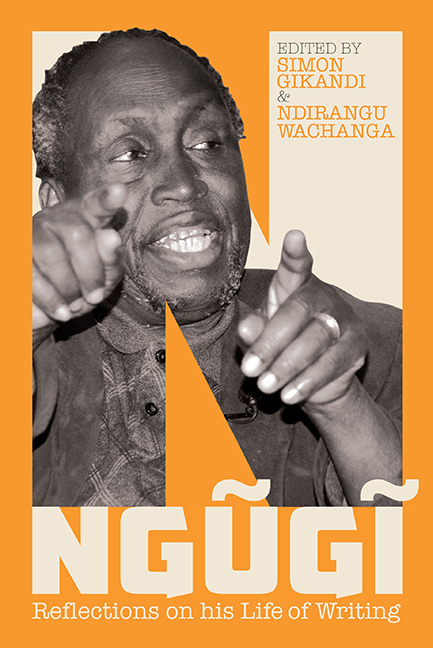Book contents
- Frontmatter
- Contents
- Preface
- Acknowledgements
- Chronology
- Photographic Section
- Introduction: Ngũgĩ wa Thiong'o: Reflections on His Life of Writing
- Ngũgĩ at Work
- Part I Serenades & Beginnings
- 1 Hyperbolic Praise Poetry for Ngũgĩ @80 … In Imitation of African Orature
- 2 A Song at Dawn (for Ngũgĩ wa Thiong'o)
- 3 Ngũgĩ in Eritrea
- 4 Up From Makerere: On the Publication of Weep Not, Child
- 5 Encountering Ngũgĩ at Leeds: An Interview with Peter Nazareth
- 6 The Book that Made Me: On Weep Not, Child
- 7 Note from a Literary Son
- 8 What is in a Name?
- 9 In Exile: Between Britain & Kenya
- Part II Memories, Recollections & Tributes
- Part III Working with Ngũgĩ
- Part IV The Writer, the Critic & the World
- Part V The Other Ngũgĩ
- Appendixes
- References
- Bibliography of Ngũgĩ's Primary Works
- Works Cited
- Notes on Contributors
- Index
3 - Ngũgĩ in Eritrea
from Part I - Serenades & Beginnings
Published online by Cambridge University Press: 27 July 2019
- Frontmatter
- Contents
- Preface
- Acknowledgements
- Chronology
- Photographic Section
- Introduction: Ngũgĩ wa Thiong'o: Reflections on His Life of Writing
- Ngũgĩ at Work
- Part I Serenades & Beginnings
- 1 Hyperbolic Praise Poetry for Ngũgĩ @80 … In Imitation of African Orature
- 2 A Song at Dawn (for Ngũgĩ wa Thiong'o)
- 3 Ngũgĩ in Eritrea
- 4 Up From Makerere: On the Publication of Weep Not, Child
- 5 Encountering Ngũgĩ at Leeds: An Interview with Peter Nazareth
- 6 The Book that Made Me: On Weep Not, Child
- 7 Note from a Literary Son
- 8 What is in a Name?
- 9 In Exile: Between Britain & Kenya
- Part II Memories, Recollections & Tributes
- Part III Working with Ngũgĩ
- Part IV The Writer, the Critic & the World
- Part V The Other Ngũgĩ
- Appendixes
- References
- Bibliography of Ngũgĩ's Primary Works
- Works Cited
- Notes on Contributors
- Index
Summary
‘Farewell to English … for any of my writings. From now on
It is Gĩkũyũ and Kiswahili all the way’, Ngũgĩ
Famously stated in 1986, and he became
African languages’ greatest hero for literature,
Not knowing then ‘all the way’ would lead him to Eritrea,
Writing in African languages, in literature and
Orature, ‘all the way’ back, millennia; continual,
Written examples, unceasing, and where the colonial
Languages never became the norm in literature – thus
Different from most of Africa and still that way today.
Far more known then (and known more now, even after all this time)
Was the armed struggle of Eritrea for independence.
Nevertheless, Ngũgĩ wrote two decades after his ‘farewell’,
2006, after reading Eritreans translated:
‘Four thousand years … from the ancient stele in Belew Kelew to
Twentieth-century battlefields … into the twenty-first…’
Poets from there never gave ‘up writing in their … languages’.
Therefore, ‘their poetry thrives’. He knew because he went there twice.
Early December in 1998 he visited
For the first time as an introduction yet in connection
With a big conference he agreed to lead, ‘Against All Odds’:
Focused on African languages and literatures, named
With the same phrase often used to brand the Eritrean war
For independence, an all but hopeless, protracted struggle.
Ngũgĩ, of course, was adverse to hype and thought the phrase too much
Without the ‘languages’ part. He even said, when I asked him,
‘Heinemann's treated me rather well and has served African
Europhone writers well, too. But if the phrase applies to the
Struggle of African language writers it might not be an
Exaggeration’. In Eritrea, all the writers used
African languages – ‘with our fathers, the Italians
As the exception’, the joke said. Therefore, Ngũgĩ and ‘Eritrea’
Seemed like a match made in heaven … or better, Africa itself.
Zemhret Yohannes, the Eritrean leader in culture
Hosted his travel, and Kassahun Checole, the publisher,
Made the trip happen and flew with Ngũgĩ from America.
On this first visit, again the war between Eritrean
And Ethiopian armies stalked the Horn, but ‘che guerra?’
Asked people in Eritrea's biggest city, Asmara.
- Type
- Chapter
- Information
- NgugiReflections on his Life of Writing, pp. 36 - 40Publisher: Boydell & BrewerPrint publication year: 2018



